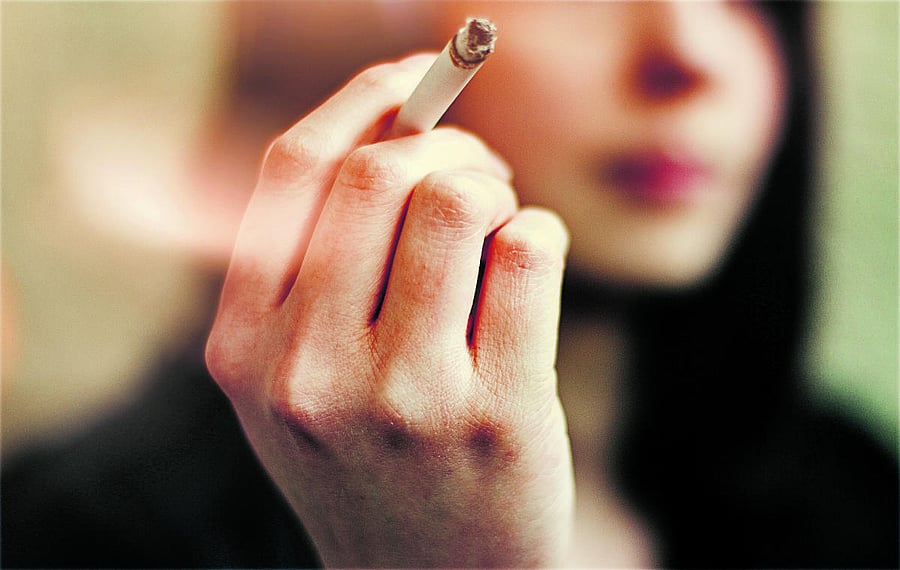
We shrug our shoulders when see the graphic warning images on cigarette packets; we make fun of the anti-smoking advisories that are played before movies; work breaks are synonymous with puffing on a cigarette. But finally there might be something that can scare us into rethinking our habit — the Director-General of the World Health Organisation has asked people to say no to smoking as it can increase the risk of developing severe diseases, if one becomes infected with Covid-19. Though the studies are still in preliminary stages, health reseachers are exploring the link between weakened lungs and susceptibility to the virus.
India has long struggled with the burden of tobacco and smoking, with more than 10 million people dying each year due to tobacco. Of late, the percentage of women smokers has seen a steady rise, making them also prone to lung cancer and other deadly diseases. With March 24 being World Tuberculosis Day, Metrolife reached out doctors in the city to find out how prevalent is the habit of smoking and what are the dangers.
Use increases with age
Dr Vishwanath Bellad, a consultant pulmonologist from BGS Gleneagles Global Hospital, points out that the usage of tobacco surges concomitantly with increasing age.
“Its dependency is highest among individuals aged 45 and above, comparatively less among individuals from 24–44 years age group, and least among individuals below 24. The most vulnerable age for the initiation of tobacco consumption is late adolescence and early adulthood,” he says.
Use of smokeless tobacco more prevalent
A larger population of males consume smoking/smokeless tobacco products as compared to females. “The incidence of smoking varies among both men and women. According to a recent survey, 19 per cent of all men and 2 per cent of all women smoke, while 29.6 per cent of all men and 12.8 per cent of all women use smokeless tobacco products,” says Dr Vishwanath.
Smokeless tobacco is mainly consumed in the form of khaini, gutka, and betel quid.
More women smoking now, numbers expected to go up
Dr Madhusudan BK, senior consultant neurologist and epileptologist and stroke specialist, BGS Gleneagles Global hospital says that the gap between the smoking rates of men and women has reduced in the recent years. “Currently women are sharing a much larger burden of smoking-related diseases as compared to men. About, 30 per cent of the smokers start their first cigarette during their academic years and most of them are women,” he says.
He adds that though the rate of tobacco use among men is expected to fall, the rate of women smokers is is estimated to see a substantial increase by 2025. “It is also observed that women have a 25 per cent greater increased risk of suffering from coronary heart disease compared to male smokers.”
Cigarette smoking accounts for 90 per cent of lung cancers
The risk of developing lung cancer for a smoker is many times more than that of someone who has never smoked. However, risk denial among such people is quite common, says Dr Siri Kamath, consultant physician, BGS Gleneagles Global Hospital. “Smokers hold many self exempting beliefs such as ‘smoking is not more dangerous than air pollution’, ‘most people who smoke never get sick’, ‘I smoke too few cigarettes and so the problem does not apply to me’ and so on. The reality however is that even smoking one to four cigarettes a day puts them at risk for a large variety of cancers, hypertension, heart disease, obstructive lung disease and more,” she adds.
Kick the habit
You are at home with no office and lesser work stress, your family is there with you at all times and there is a deadly virus lurking outside — what better time than this to quit smoking and finally take it off your New Year resolutions list? Dr Pavan Yadav, consultant, Interventional Pulmonology, Aster RV Hospital, tells you how you can do it.
Keep in mind that a firm commitment is half the battle won. Seek motivation from others who have successfully stopped smoking.
Once you quit, it is possible to get the urge to return to the habit.
Distract yourself when you feel like smoking. Exercise, cook, go out into the garden etc until the urge passes.
Make use of Nicotine Replacement Therapy (in the form of patches, chewing gum, nasal, mouth spray). NRT provides small doses of nicotine minus tar, carbon monoxide and other cancer causing substances in a cigar.
Seek social support. Involve your family in the de-addiction process so they can help you when you start feeling anxious.
Seek help in the form of support groups. Join a cigarette de-addiction support group near you so that you have other people who can relate to what you’re going through.
It is normal to experience night sweats, irritability, anxiety, weight gain, etc as your body recovers from nicotine addiction.
Eat healthier and hydrate well during this period to help your body.
